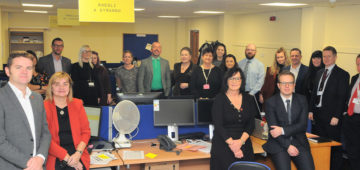- 03 March 2020
75 per cent of Welsh public sector employees surveyed have good awareness of Adverse Childhood Experiences (ACEs). However, only 36 per cent feel confident in their knowledge and skills to help prevent ACEs within their role.
The survey’s purpose was to better understand the knowledge and awareness of ACEs amongst public services in Wales, including the charitable and third sectors.
3,033 people from 12 employment sectors responded, providing an overview from a diverse cross section of public service workers in Wales. The survey findings include:
- 75% of respondents had heard of ACEs before the survey. The highest of these were employed within youth services (92%) and charitable/third sector (90%).
- 58% were unsure whether their organisation endorsed ACE-informed skills and knowledge at recruitment stages.
- 48% were unsure whether their organisation’s policies had ACE-informed principles and practices.
- 47% had been offered formal training from their employer or another provider within the last 18 months which had information about ACEs.
- 48% felt confident in their knowledge and skills to mitigate ACEs within their role.
The findings reveal high levels of awareness and knowledge of ACEs amongst the publicly funded workforce in Wales. Respondents also showed good awareness of the impacts of ACEs on both physical and mental health, but had less awareness for prevention and mitigation measures. This has been identified as an area for future training and development, with a focus on families and tackling poverty, across different sectors.
Almost half of those surveyed had been offered ACEs training, and just over three quarters of those who attended training with ACE content felt it had improved their knowledge and awareness. This demonstrates how initial ACE-awareness training has been making an impact on publicly funded services.
The report also identified several key considerations for future actions. These include:
- The development of ACE-awareness training with a focus on prevention and mitigation knowledge and skills. This should be done using co-productive approaches to embed a sustainable model across organisations.
- Considering the training needs of the wider Wales workforce (beyond the public sector) if we are to become a truly ACE-aware nation.
- Conducting future research to better understand the national strategies and approaches which will have the best impact on the reduction of ACEs in Wales.
- Considering auditing the scope and breadth of ACE training currently on offer across Wales to establish what is working, for whom and why.
- Building on further strategic work with organisations to promote a holistic approach through the embedded practice of ACE-awareness in organisational leadership, and ACE-informed policies and practices to support.
Genevieve Riley, Senior Researcher for Evaluation and Impact, Knowledge Directorate, Public Health Wales, said:
“The survey is very positive news regarding awareness of ACEs in the Welsh public sector. But it has also identified a number of potential areas to focus on to further support the workforce across public sectors in Wales to tackle ACEs and become even more ACE-informed.”
Read the report here



